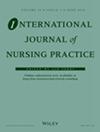The Relationship Between the Digital Clinical Practice Environment, Unmet Expectations and the Successful Transition of Nursing Students: A Cross-Sectional Study
Abstract
Aims
This study investigates how unmet expectations in the digital clinical practice environment for elderly care impact the negative affect and turnover intentions of students majoring in elderly care and examines the moderating role of proactive personality traits.
Methods
A cross-sectional study was conducted between December 2022 and March 2023. Participants included 609 nursing students from 16 schools in Anhui Province, China, who met inclusion criteria and consented to participate. They completed the Digital Technology Unmet Expectations Scale, Negative Affect Scale, Proactive Personality Scale and Turnover Intention Scale. Data analysis was performed using SPSS and SmartPLS.
Results
Unmet expectations regarding digital technology were identified as significant barriers to the successful transition of elderly care students into the workforce. However, no moderating effects of proactive personality were found on the relationships between unmet expectations concerning system quality and negative affect, unmet expectations regarding information quality and negative affect or unmet expectations regarding system quality and turnover intention.
Conclusion
Findings suggest that unmet expectations related to digital technology in the clinical training environment hinder the transition of elderly care students to the workforce. It is essential to implement measures to facilitate a smoother transition for students in this field.
Summary
What Is Already Known About This Topic?
- The high rate of nursing student turnover is one of the major reasons for the shortage of elderly care nurses.
- The turnover intention of nursing students is influenced by many factors.
- Few studies have examined the mechanism of unmet expectations in the digital clinical practice environment of elderly care on the turnover intentions of students.
What This Paper Adds?
- Extends the application of the Stimulus-Organism-Response (S-O-R) model to explore the relationship between digital technology use and turnover intentions in the nursing field.
- This study shows that unmet expectations regarding digital technology in the clinical practice environment affect the successful transition of students to the workforce.
- Expands understanding of the application of proactive personality traits in nursing, exploring their moderating role in digital technology and turnover intentions.
The Implications of This Paper:
- This study highlighted the importance of the digital clinical practice environment for nursing students in elderly care.

 求助内容:
求助内容: 应助结果提醒方式:
应助结果提醒方式:


